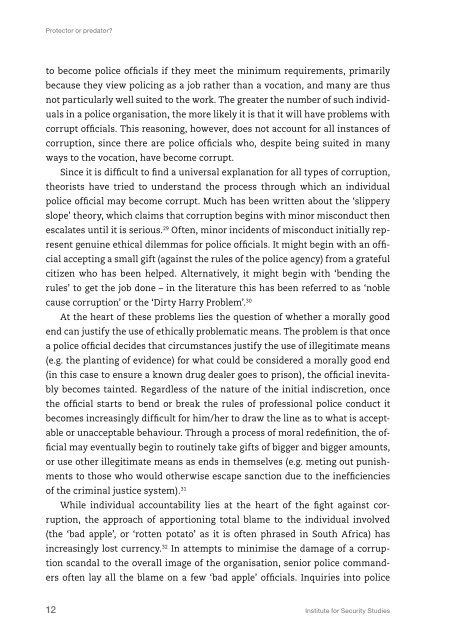Protector or predator? - Institute for Security Studies
Protector or predator? - Institute for Security Studies
Protector or predator? - Institute for Security Studies
You also want an ePaper? Increase the reach of your titles
YUMPU automatically turns print PDFs into web optimized ePapers that Google loves.
<strong>Protect<strong>or</strong></strong> <strong>or</strong> predat<strong>or</strong>?<br />
to become police officials if they meet the minimum requirements, primarily<br />
because they view policing as a job rather than a vocation, and many are thus<br />
not particularly well suited to the w<strong>or</strong>k. The greater the number of such individuals<br />
in a police <strong>or</strong>ganisation, the m<strong>or</strong>e likely it is that it will have problems with<br />
c<strong>or</strong>rupt officials. This reasoning, however, does not account f<strong>or</strong> all instances of<br />
c<strong>or</strong>ruption, since there are police officials who, despite being suited in many<br />
ways to the vocation, have become c<strong>or</strong>rupt.<br />
Since it is difficult to find a universal explanation f<strong>or</strong> all types of c<strong>or</strong>ruption,<br />
the<strong>or</strong>ists have tried to understand the process through which an individual<br />
police official may become c<strong>or</strong>rupt. Much has been written about the ‘slippery<br />
slope’ the<strong>or</strong>y, which claims that c<strong>or</strong>ruption begins with min<strong>or</strong> misconduct then<br />
escalates until it is serious. 29 Often, min<strong>or</strong> incidents of misconduct initially represent<br />
genuine ethical dilemmas f<strong>or</strong> police officials. It might begin with an official<br />
accepting a small gift (against the rules of the police agency) from a grateful<br />
citizen who has been helped. Alternatively, it might begin with ‘bending the<br />
rules’ to get the job done – in the literature this has been referred to as ‘noble<br />
cause c<strong>or</strong>ruption’ <strong>or</strong> the ‘Dirty Harry Problem’. 30<br />
At the heart of these problems lies the question of whether a m<strong>or</strong>ally good<br />
end can justify the use of ethically problematic means. The problem is that once<br />
a police official decides that circumstances justify the use of illegitimate means<br />
(e.g. the planting of evidence) f<strong>or</strong> what could be considered a m<strong>or</strong>ally good end<br />
(in this case to ensure a known drug dealer goes to prison), the official inevitably<br />
becomes tainted. Regardless of the nature of the initial indiscretion, once<br />
the official starts to bend <strong>or</strong> break the rules of professional police conduct it<br />
becomes increasingly difficult f<strong>or</strong> him/her to draw the line as to what is acceptable<br />
<strong>or</strong> unacceptable behaviour. Through a process of m<strong>or</strong>al redefinition, the official<br />
may eventually begin to routinely take gifts of bigger and bigger amounts,<br />
<strong>or</strong> use other illegitimate means as ends in themselves (e.g. meting out punishments<br />
to those who would otherwise escape sanction due to the inefficiencies<br />
of the criminal justice system). 31<br />
While individual accountability lies at the heart of the fight against c<strong>or</strong>ruption,<br />
the approach of app<strong>or</strong>tioning total blame to the individual involved<br />
(the ‘bad apple’, <strong>or</strong> ‘rotten potato’ as it is often phrased in South Africa) has<br />
increasingly lost currency. 32 In attempts to minimise the damage of a c<strong>or</strong>ruption<br />
scandal to the overall image of the <strong>or</strong>ganisation, seni<strong>or</strong> police commanders<br />
often lay all the blame on a few ‘bad apple’ officials. Inquiries into police<br />
12<br />
<strong>Institute</strong> f<strong>or</strong> <strong>Security</strong> <strong>Studies</strong>

















